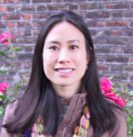
Research Interests:
Cell polarity, chemotaxis, actin cytoskeleton, cell signaling, cell migration, microscopy, biochemistry, neutrophils, systems biology, self-organization, inflammation, Rac, PI3Kinase, WAVE complex.
Summary:
Proper movement in response to cues from the outside world is as important for single cells as it is for drivers on a busy highway. If cues are misinterpreted or the movement goes awry, terrible accidents ensue, the delicate wiring of the nervous system fails, single-celled organisms can`t hunt or mate, the immune system ceases to function properly, and cancer cells spread from one part of the body to another. How do single cells, without the benefit of a brain, interpret the subtle micro-world of attractants and repellents to decide where to go? Our research focuses on dissecting the inner workings of the cellular “compass” used to guide cells on their journey. Because the core of the compass has been conserved over more than a billion years of evolution, we have been able to combine discoveries from yeast to humans to glimpse some rough outlines of the underlying machinery. However, many of the important connections are still missing. Our research focuses on identifying these key missing components and how they are wired together to process information with the hope that we can eventually make cells move when (and where) we want them to and stop them when we don’t.
UCSF Profiles Page











